A Portuguese resident has lifted the lid on a ‘rip-off’ that tourists often fall for when landing one of the country’s most visited destination – and says it sees them ‘paying treble’ of the true cost.
Instagrammer @nationswithoutborders, who lives with her American husband in Portugal but hails from the Netherlands, regularly shares money-saving travel tips for people visiting the country.
Her latest sage advice involves getting from popular city break Lisbon’s airport into the centre, without falling for hefty taxi charges often applied by local drivers – with one person saying they’d experienced it first hand, paying €120 (£102) for a one-way trip that’s just 4.3 miles.
Holidaymakers who arrive at the Humberto Delgado Airport in Lisbon might spy the ‘taxi’ signs and head straight for them – but should, says @nationswithoutborders, not jump in one unless they don’t mind paying through the nose.
She explains: ‘Taxis aren’t necessarily bad and not all taxi drivers are scammers, but it is generally known by the people living in Lisbon that there is a big, big chance that you’ll get ripped off by the taxis at the airport.’
Captioning her video ‘Alert to anyone arriving at Lisbon Airport’ she details how the ‘well organised’ queue looks enticing because it moves quickly – but says standing in line could see you ripped off in two ways.
The first is when ‘you or the taxi driver instigates a negotiation session’, where you discuss the price – often inflated – in advance and then don’t have the meter on during the journey.
The second is just blindly getting in the cab without negotiating a price first, which she calls a ‘rookie mistake’, which leads to the taxi driver ‘making up a number at the end of your trip’.

Travel tips influencer @nationswithoutborders, who’s Dutch but lives in Portugal, regularly shares her wisdom on how tourists can not get ripped off when holidaying there
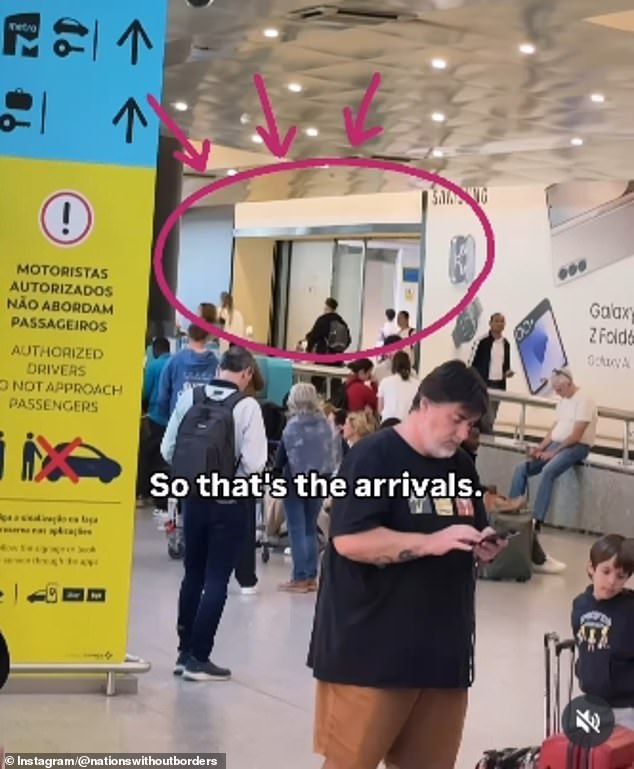
In the super helpful video, the travel influencer signposts where tourists should go to get a ride into town – and it’s not the taxi queue
The price a taxi journey into Lisbon is likely to cost tourists could be as much as ‘three times the price of an Uber’, says the travel tipster – and significantly higher than the Metro.
A standard trip with a taxi driver costs up to €25 (£21) in a metered car compared to an Uber journey, which costs around €9 (£7.67) for the short journey.
Meanwhile, the city’s Aeroporto – Saldanha Metro line takes just 20 minutes and costs less than £2 for a single journey.
One local said the video offered great advice, writing: ‘I am Portuguese and I 100% approve this video! Uber or Bolt is the way to go, and not only at the airport!’
Another said they’d heard horror stories of people being charged up to €80 (£68) for the ten-minute ride and one person said they paid even more.
They wrote: ‘Arrived in Lisbon last week, was charged €120 (£102) by taxi outside airport, got Uber back to airport and it was €39 (£33). Totally ripped off…’
However, others disputed the tip, with one saying: ‘Took a taxi from the airport just last week and had absolutely no issue, price was fair, around €20. Helped with our luggage and even gave us recommendations.’
In 2024, tourists were warned about restaurants in Lisbon also reportedly ripping off tourists with higher prices than they charge to locals, who are given cheaper rates for food on a wink-and-nod basis.
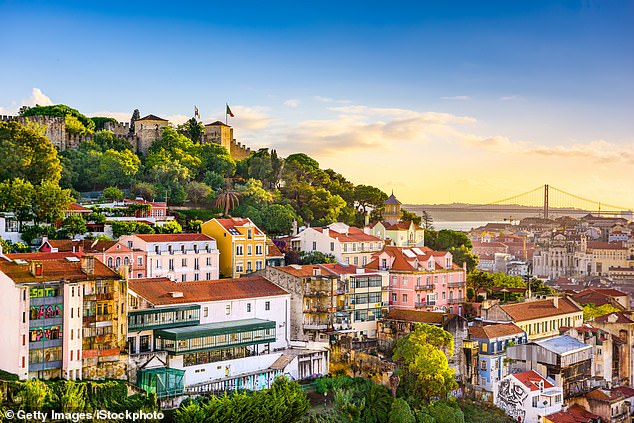
Lisbon is a huge tourism draw, bringing in six million visitors each year – but visitors can face higher prices on the ground
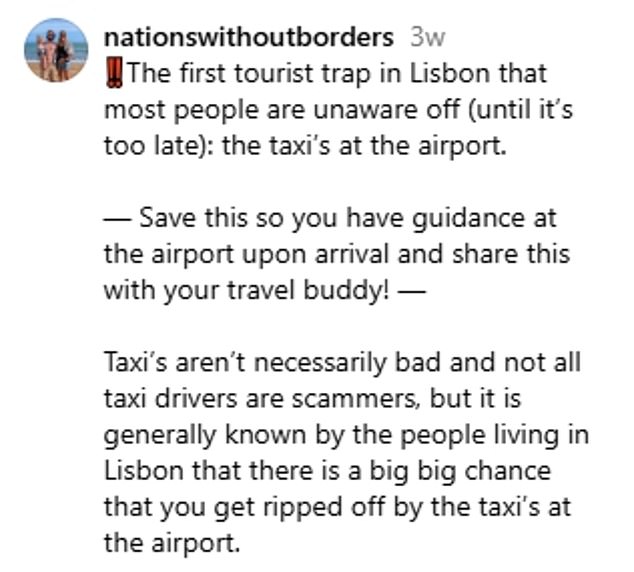
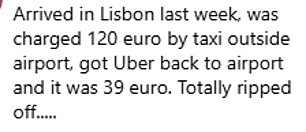
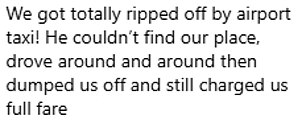
Some tourists have had positive experiences, but others have complained about high taxi fares in the city
A report in a Portuguese newspaper claimed multilingual menus given to holidaymakers visiting the capital have higher prices than those charged to residents.
The lower prices are ‘transmitted verbally, in whispers or indicated on menus placed in inconspicuous or even hidden areas’, the report claims.
Industry experts said the selectively different pricing for people based on their nationality is ‘completely illegal’ while Portugal’s national hospitality trade body said at the time that it was not aware of the practice taking place.
Last week, tourists and locals in a popular Spanish holiday hotspot have been issued a warning about a parking scam.
Alicante’s council has warned that the new scam has been catching out locals around the city.
The crafty scammers have been leaving fake parking fines on people’s windscreens in Alicante, reports Euro Weekly News.
The fake fines have a QR code printed on them which the drivers are expected to scan.
Once they do so, the QR code will take people to the scammers’ website which asks them to enter their personal and banking details.
The scammers may then be able to take large amounts of money from their victims using the fake website.
The council explains that a real parking fine won’t come with a QR code. An official fine will also have ‘Boletin de denuncia’ at the top.
It will also have the Ayuntamiento (council) logo at the top and drivers will be asked to use a barcode, not a QR code, to register their fine.
If drivers find a ticket with a QR code on their car, they should take a photo of it and let the local police know.
While the scam has been reported in Avenida Benito Perez Galdos, officials suspect that the conmen are also targeting other neighbourhoods in Alicante.
Officials recommend that tourists check any suspicious-looking tickets with the council or police.
Most importantly, tourists should never scan a QR code if they find one on a fine attached to their car.












